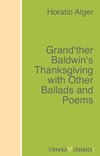Kitabı oku: «Tom, The Bootblack: or, The Road to Success», sayfa 12
CHAPTER XXXIV.
A RIDE THROUGH THE WOODS
The next morning, when the three were seated at the breakfast table, Mr. Grey said:
"Jasper, I think I shall leave you to amuse yourself this morning. I propose to invite Gilbert to accompany me on a drive."
"All right, father. Where do you intend driving?"
"I scarcely know, yet. There are many pleasant places in the neighborhood which it is worth while to visit."
"I wonder what the old man's up to?" thought Jasper. "No good to Gilbert, I'll be bound. Well, I've had my turn, and it's no more than right that he should take his. I won't ask any inconvenient questions."
"Will that arrangement be agreeable to you?" asked James Grey, turning to his young visitor.
"I shall be happy to accompany you, Mr. Grey," answered our hero, politely.
"Then it is settled. I will order the chaise round to the door at ten o'clock."
"I will be ready, sir."
Jasper looked at his father curiously, as Gilbert left the room. His look was returned by one equally significant.
"Ask no questions," it said, and Jasper sauntered out of the room, in mute obedience.
Ten o'clock found the chaise before the door. Gilbert was on hand, and so was his uncle.
"Jump in, Gilbert," said Mr. Grey.
Our hero did so, and James Grey followed.
Jasper stood near, and looked on.
"He isn't coming back," he said to himself. "I saw it in my father's eyes. He won't dare to kill him, I wonder?"
The question, which should have produced a feeling of horror, only caused a feeling of curiosity, and he walked away, in the confidence that the dangerous foe to his prospects was to be disposed of somehow.
"It is a pleasant morning for driving," said Mr. Grey, by way of opening the conversation.
"Yes, sir, very pleasant."
"Did you have any more trouble with Bucephalus yesterday?"
"No, sir. He has given up the contest."
"I am glad to hear it."
"How large is your estate, Mr. Grey?"
This was a simple question, but James Grey understood it as implying curiosity on the part of our hero to learn how large a property he could claim.
"There are about two hundred acres," he answered. "By the way, we have not yet spoken of your claim."
"No, sir."
"I have been meaning to go to Alton to consult my lawyer. I have delayed it longer, perhaps, than I should. To-morrow I will attend to it, and report to you the result."
"Thank you, sir. I don't like to hurry you, but a decision is so important to my plans in life that I should like the matter decided as soon as possible."
"Of course, your feeling is only natural. Indeed, I have reason to feel in the same way, for if your claim is sustained it will reduce me to comparative poverty, and my poor boy also."
James Grey spoke with affected feeling, and Gilbert responded, quickly:
"Don't think so meanly of me, Mr. Grey, as to suppose that I should be willing to reduce you and Jasper to poverty. I can not give up my rights, but I will take care that you are saved from any pecuniary want."
"Will you, indeed?" said Mr. Grey to himself, with a sneer. "Thank you for nothing, young man; I intend to provide against that contingency myself."
What he said aloud was something very different.
"I feel sure that in any event I can rely on your forbearance," he said. "But the decision may be in my favor, and in that case I will not be behind you in generosity. I will do what I can to further your interests, though I do not promise to do as much for you as an own son."
"Of course not, sir. I thank you for your offer."
Mr. Grey spoke so frankly and fairly – he was one of those who could assume a virtue though he had it not – that Gilbert was partially deceived – so far, at least, as to question the correctness of his former impressions of his uncle. Nevertheless, he could not help calling to mind that this man, fairly as he now spoke, had in all probability conspired against him, dooming him to privation and penury for nearly ten years, while he and his son had been living luxuriously. On the whole, his uncle was a puzzle to him. He exhibited such a contrariety of character and disposition, that he knew not to what decision it would be right to come respecting it.
"I am going to avoid the village, Gilbert," said his uncle, "and drive you along a very charming road, or rather cart-path, threading the woods. The trees are now looking very beautiful with their changing foliage, and I think you will like it better than the ordinary road."
"You are right, sir, I should," answered Gilbert.
"It will give you an idea of our Western forests. I suppose you are only familiar with those in the East?"
"I am not familiar with any. I have always lived in the city – first in New York, and afterward in Cincinnati."
Gilbert would have mentioned his residence in Australia, but he thought that the reference to it might be construed by his uncle into a tacit reproach, and therefore forbore.
They turned from the main road into one not much frequented, and speedily entered the forest. Not a suspicion of his uncle's bad faith, or of any conspiracy against himself, entered the mind of our hero. He had not yet fathomed the depth of his uncle's wickedness.
"Jasper never cares to ride in this direction," said Mr. Grey. "He has no love for Nature."
"He has told me that he would rather live in the city."
"Yes, he would; but I am attached to the country. I suppose when he grows older that he will insist upon leaving me. That will leave me indeed solitary."
They kept on till they were in the heart of the woods. As Mr. Grey had said, the road was now but a cart-path, bordered on either side by tall, straight trees. Suddenly, from a covert of underbrush, a ruffian sprang out, and seized the horse by the bridle.
CHAPTER XXXV.
HOW GILBERT IS DISPOSED OF
"What do you want, fellow?" demanded James Grey, sternly, in order to keep up appearances, for he recognized his confederate. "Let go that bridle."
"I want money," said Hugh Trimble, for, of course it was he.
"Is this the fashion in which you ask it?" said Mr. Grey. "Let go my bridle, and come round to my house. Then I will listen to your application, and, if I find you deserving, I will grant your request."
"That don't go down," said Hugh, roughly. "You rich men take good care of your money. I shouldn't stand no chance at your house."
"As much there as here."
"Maybe not," said the man, significantly. "There you'd be master. Here, I am master."
"What do you mean by that?"
"I mean that I want five hundred dollars, and I mean to have it."
"Do you dare to threaten me?"
"Yes, I do. You are a rich man – I am poor. You can spare five hundred dollars without feeling it."
"I don't intend to be forced into giving you money. Let go that bridle, or I will run over you."
"I will stand by you, Mr. Grey," said Gilbert, speaking for the first time. "Don't submit to that man's demands."
"Young man," said Hugh, "you'd better not interfere. You can't help your father."
"He is not my father."
"No matter what he is, you'd better keep out of the affair. That's the advice I give you."
"I shall stand by him," said Gilbert, spiritedly. "You've got two against you."
"And you've got two against you," said Hugh, drawing a pistol from a side-pocket. "What do you say to that?"
"My friend, what is it that you demand?" asked Mr. Grey.
"So I'm your friend now, am I?" retorted Hugh, with a mocking laugh. "It's the pistol that's done it, I reckon."
"I repeat it – what do you want?"
"Five hundred dollars."
"I left my pocket-book at home. I will go back and get the money."
"Do you take me for a fool? You would come back with an officer of the law."
"I promise you that I will lay no trap for you."
Here Hugh seemed to hesitate.
"I'll tell you what I'll do," he said, finally. "Leave the boy with me as a pledge, and I'll let you go."
"Suppose I don't?"
"I'll shoot you on the spot!"
James Grey turned to Gilbert.
"You hear what he says? Are you willing to remain with him while I go back and get the money?"
Gilbert did not fancy the plan, and hesitated.
"If there is no other way," he said, at length.
"My friend," said Mr. Grey, "I will stay with you, and send the boy home."
"I won't trust him," said Hugh, who had learned his lesson well. "Besides, he cannot get the money as well as you."
"There seems no help for it, Gilbert," said James Grey, turning to his nephew. "He insists upon retaining you, but it shall not be for long. I will at once obtain the money, and come back and release you. He is armed, and we are not. We cannot resist him."
"If you think it best," said Gilbert.
"I am afraid there is no other way. My friend, suppose I give you my promise to come back, will you excuse this young man from stopping?"
"No!" said Hugh, shortly.
"Say no more," said Gilbert. "I will remain."
He jumped lightly from the chaise, and Hugh released his hold of the bridle.
"When shall you be back?" he asked.
"At three o'clock this afternoon."
"I will be on hand with the boy."
"Keep up your courage, Gilbert," said Mr. Grey, as he drove away.
Out of sight, a smile of triumph overspread his face.
"I didn't think Hugh would do his part so well," he soliloquized. "Really he is quite an actor. So I am rid of my troublesome responsibility at last. I hope never again to set eyes upon him."
On reaching home he stated that Gilbert had suddenly received a telegram summoning him to St. Louis; that he had carried him to a landing-place for the river boats, and agreed to dispatch his luggage to the Planters' House in that city by express. To keep up appearances he did so dispose of Gilbert's carpet-bag, directing it to
"Gilbert Grey, Planters' House, St. Louis, Mo."
"'Pears like he left mighty suddint," said Pompey.
"Yes; he has a friend very sick in St. Louis," explained Mr. Grey.
"I'm sorry he's gone," said John, who suspected nothing. "He was a right fine lad, and he managed Bucephalus beautiful."
Jasper said nothing, but wondered whether Gilbert had suffered violence at his father's hands.
CHAPTER XXXVI.
HUGH BETRAYS HIS PRINCIPAL
"Follow me!" said Hugh Trimble to Gilbert.
"Where are you going to lead me?"
"Never you mind. Come along."
Gilbert saw that resistance would be useless, and he obeyed. His companion plunged into the woods, looking back occasionally to see that he was following. He kept on for about half a mile as near as Gilbert could judge, when they came to a small clearing, in the midst of which was a dilapidated log hut. It was no longer occupied, but had been deserted by the former occupant, who had gone across the Mississippi to regions yet unexplored years before.
"Go in there," said Hugh.
Gilbert entered.
He saw nothing but bare walls, all furniture having been removed when it was deserted.
Our hero looked around him curiously, and then at his conductor inquiringly. He was not long in doubt as to his intention.
Hugh drew a strong cord from his pocket, and drew near him.
"What are you going to do?" asked Gilbert.
"Tie your hands and feet," was the reply.
Gilbert shrank back.
"Don't do that," he said.
"I ain't goin' to have you run away," growled Hugh.
"I won't run away. I shall be released this afternoon at any rate, and I can stand captivity till then."
"How do you know you will get free this afternoon?"
"You promised to let me go when my uncle brought the money."
"Your uncle?" repeated Hugh, exhibiting surprise, fixing his eyes keenly upon our hero.
"Yes, he is my uncle, but he does not acknowledge me yet."
"Humph!" said Hugh, thoughtfully to himself. "Suppose he does own you, what then?"
"It is a secret."
"You'd better tell me. I have a reason for asking."
"I have a claim to the property which my uncle possesses."
"That's it. I understand it now."
"What do you understand?"
"Suppose you was to die, what then?"
"There would be nobody to disturb my uncle in the possession of his property."
"He wouldn't cry much if you was to die."
"What do you mean?" asked Gilbert, unpleasantly impressed by the man's tone.
"He wants you dead – that's the long and short of it."
"I can't believe it," said Gilbert, shuddering. "You can have no cause to say this. He can't be so wicked."
"Look here, young one," said Hugh, "I'll tell you a secret. You take me for a robber, don't you?"
"Yes."
"In course you do. Now I'm going to surprise you. My stopping your mouth to-day was all a put-up job."
"You don't mean that my uncle engaged you to do it?"
"Yes, I do."
"What was his object?"
"He don't mean to come back for you. He wants me to kill you."
"You don't mean that?" said Gilbert, horror-struck.
"Yes, I do. He's goin' to give me a thousand dollars."
"And you agreed to do it?"
"Yes, I agreed to do it."
"Would you stain your hands with murder for a thousand dollars?" asked Gilbert, solemnly.
"What can I do? I'm a poor man. Fortune has gone agin me all my life. There ain't no other way I can get money. If I was well off I wouldn't do it."
"Good Heaven! To think my uncle should be capable of such wickedness."
"It's just as bad for him, ain't it? He hires me to kill you for the sake of money. What's the odds?"
"He is worse than you. He knows that I would not strip him of everything, even if I succeed."
"What's your chances, young one? Have you got a good case?"
"If I hadn't, he wouldn't conspire for my death."
"That's so. Now, young chap, shall I kill you or not?"
"Of course I don't want to be killed, but you are too strong for me. I am in your power."
"Swear, if I spare your life, will you see that I don't lose by it?"
Gilbert caught his meaning and snatched at the chance of safety.
"If you let me go, you shall have the same amount my uncle promised you, and will have no stain of murder on your hands."
"Have you got the money?"
"Nearly all. The rest I can raise. But I will do better than that, on one condition."
"What's that?"
"If you will let me call you as a witness, to prove that my uncle engaged you to kill me, I shall be sure to recover my property, and the day I come into possession I will pay you over two thousand dollars."
Hugh's eyes sparkled, but he answered cautiously:
"Won't there be no risk? Can't they shut me up?"
"No; you can say that you entered into the plan in order to entrap my uncle."
"Will you swear to do that?"
"I will."
"Then it's a bargain. Now, what shall we do first?"
"I want you to go with me to St. Louis, but my uncle must not know that I have escaped. How can we manage that?"
"We can go up north afterward and take the boat from there. When we pass this place on the river, we'll stay down below."
"That is a good plan. When we get to St. Louis I will see a lawyer at once, and put the matter in his hands."
"I don't like to come before the court," said Hugh, reluctantly, "but I will if you say so."
"I don't think it will be necessary. When my uncle learns that his conspiracy is likely to be made known, he will be glad to compromise without a contest."
"You know best. If you'll come round with me to my hut, I'll tell the old woman what's up, and then we'll strike for the river. You won't go back on me?"
"No – that isn't my way; besides, your testimony is too valuable for me. I'll stand by you if you'll stand by me. Give me your hand."
"I'll trust you, young one," he said.
Before the sun set they were passengers on a river steamer, bound for St. Louis.
CHAPTER XXXVII.
A FINAL SURRENDER
James Grey waited at home in anxious suspense to hear from Hugh Trimble. He felt that it would not be prudent to seek him out, lest suspicion attach to himself, in case his nephew had been murdered. From time to time he realized the risk he had run, and wished he had never entered into a conspiracy against Gilbert's life.
Twenty-four hours passed, and still Hugh Trimble did not appear to claim the thousand dollars promised him for the crime he had consented to perpetrate. James Grey began to grow nervous. His nervousness increased when another day passed and still no tidings.
On the third day he was about to set out for the woods, in defiance of prudence, bent on terminating his suspense, when he received a letter post-marked St. Louis. It was addressed in a strange hand. He opened it curiously, but, as he read it, he turned pallid, and, when he had mastered its contents, he sank into a chair, overcome.
This was the letter:
"St. Louis, October – , 185 – .
"Mr. James Grey: I write you as the attorney of Gilbert Grey, claiming to be the son of your deceased elder brother, and as such entitled to the large property of which you took possession at your brother's death, and which you still hold, to his prejudice. He is prepared to prove his identity by the written death-bed confession of the clerk whom you employed to abduct him, the genuineness of which document he is also in a condition to prove. It will not be necessary to go into further particulars, since he tells me that he has already conferred with you freely on the subject, and put you in possession of all that he is able to prove.
"He is also prepared to show that you so far recognized the strength of his claim, that in Cincinnati you endeavored to destroy the written confession alluded to, and that on a later occasion you entered into a conspiracy with one Hugh Trimble to murder him, promising the said Trimble one thousand dollars for so doing. To this Hugh Trimble is ready to swear, having repented his wicked compact, and enlisted himself on the side of my client. Though we feel that exposure and punishment for this wicked plot should justly be visited upon you, we agree to keep it secret provided you interpose no obstacle to the immediate surrender to my client of the property at present unjustly withheld from him. It is desirable that you come to St. Louis at once, and settle this matter.
"Yours, respectfully,"Anthony Bates."
When James Grey reached the conclusion of this letter he realized that his plot had completely failed. His tool had turned against him, and he was in the power of his nephew. There was but one answer to make to this proposition. He dared not refuse it!
He started immediately for St. Louis, and wended his way to the lawyer's office. He feared he should find his nephew there, but was relieved to find himself alone with Mr. Bates.
"To what decision have you come, Mr. Grey?" asked the lawyer.
"What terms do you offer?"
"Silence, provided you surrender the estate at once."
"It will render me penniless."
"At what do you estimate the value of the estate?"
"One hundred and fifty thousand dollars."
"This is about the figure at which my client estimated it. I am authorized by him to offer you ten thousand dollars in hand, and an annual income of two thousand dollars upon the acknowledgment without delay of the rightfulness of his claim."
It was more than Mr. Grey hoped for. He judged his nephew by himself, and doubted, especially after his attempt upon his life, whether he would not leave him to the bitterness of utter poverty.
"I accept the terms," he said, briefly.
"Then the proper papers shall be made out at once."
Now that Mr. Grey offered no further opposition, there was no further cause of delay. An hour later, Gilbert had in his possession the legal document which restored him to his rights, and made him a rich man.
His uncle received in exchange a paper, assuring to him the provision which Gilbert had generously made. Armed with this, he went home without seeing his nephew.
He was ashamed to face the lad whom he had so basely defrauded, and still more basely sought to slay.
When Jasper, to whom he had said nothing of the motive of his journey, met him, he at once detected the trouble in his father's manner.
"What is the matter, father?" he inquired.
"All is lost, Jasper," said his father.
"What do you mean?"
"Gilbert has triumphed, and I am a comparative beggar."
"Then what is to become of me?" demanded Jasper, thunder-struck.
"Always yourself!" repeated his father, bitterly. "You have no feeling for me. All your anxiety is for yourself."
"I never pretended to be an affectionate son," said Jasper, coolly. "It's my belief that you've mismanaged this matter somewhat. You'd better have left it in my hands."
"I did the best I could, but Gilbert is sharp and no baby. You might know that from the way in which he tamed Bucephalus."
"I wish the brute had broken his neck."
"I don't know," said James Grey, slowly. "I believe Heaven is on his side, and we can't fight against Heaven."
"Perhaps you are content to be a beggar. I am not."
"We are not beggars. Your cousin leaves us ten thousand dollars, and assures us an annual income of two thousand dollars."
"That is not bad," said Jasper, with a sigh of relief. "I hope you don't mean to stay in this dull hole."
"No, it would be disagreeable. When money matters are fairly settled, I propose that we shall leave the country, and settle in Europe."
Jasper's eyes sparkled.
"The most sensible thing you could decide upon, father. It isn't so bad after all. We can live comfortably on our income abroad."
"Not as we have done."
"I don't care. I shall get out of this hole, and this life."
A month later Jasper and his father sailed for Europe. They are still living there – not happily, for Jasper is not a model son, and his ingratitude and want of ordinary feeling, affect his father the more that he is thrown upon his society chiefly for companionship.
When Gilbert had settled his affairs he removed to Cincinnati. He was received with a warm welcome by Mr. Ferguson, who heartily rejoiced in his success. Maurice Walton was filled with envy and disappointment. His rival had been lifted so far above him that there could be no longer rivalry. Gilbert was a young man of fortune, while he was a poor clerk on a small salary. The worst of it was, that there was no hope now of winning Bessie Benton. But, had Maurice been wiser, he might have seen long ago that he had no hope there. Bessie knew him too well, and though she felt a friendly interest in his welfare there was no chance of any warmer feeling. She had a partiality for Gilbert, while he was still poor. As years passed it became further developed, and I am sure my readers will not be surprised to learn that she now writes her name Bessie Grey.
But I have not yet done with my hero. As may be supposed he resigned his clerkship in Mr. Ferguson's establishment, generously asking that Maurice be appointed his successor, and privately agreeing that if Mr. Ferguson would pay him the same salary he had himself received, he would make up any part that he might not earn. But I am glad to say that Maurice turned over a new leaf, and stimulated by the double pay now received, became so much more efficient that Gilbert was not called upon to make good any deficiency. As for Gilbert himself, at the suggestion of Mordaunt, his roommate, he decided to study law, entering the office of the latter, now in successful practice. In due time he was admitted to the bar. He spent a year in Cincinnati, but was led then to remove to Wisconsin, Bessie Benton accompanying him as his wife. Here he soon began to win reputation, and at this moment he holds a position of high official trust in his adopted State.
We take leave of "Tom, the Bootblack," trusting that the record of his struggles and final success may inspire all boys who read it to emulate him in bold and manly effort.
THE BURIED TREASURE.
Davie Cameron was only a poor peasant, and the cottage or sheiling where he dwelt was a humble one, even for that wild Scottish valley; but though he had a small habitation, and was poor in worldly goods, he had a large heart, and was rich in that contentment which is better than gold. He often averred that he envied not the king on his throne, though, considering what very poor luck the Scottish monarchs have had, you may think that wasn't saying much.
Davie was gardener to the Laird of Lanarkville, just as his father had been gardener to a former Laird of Lanarkville, and his grandfather to one still more remote.
If the testimony of Davie's old grandmother was to be trusted, the ancient glories of the house of Lanark had dwindled away from generation to generation, so that nowadays there was nothing to be compared with the splendors she had seen when she was a lassie. She was greatly scandalized because the present laird not only superintended the affairs of his estate, but had even been known to labor with his own hands.
"His forbears wad hae scorned to do the like," she would exclaim, adding, with a mysterious shake of the head, "but gin the young laird had a' that belanged to him, he wad na need to dicker and delve like ane o' his ain sarvants, forsooth!"
The story which lay concealed in these words was this:
In the year 1745, when the then existing laird forsook his home to follow the fortunes of Prince Charles Edward – for he was a staunch Jacobite – he enclosed his treasure in an iron box and buried it in the earth. The sole witness and aid to this transaction was his faithful follower, Hugh Cameron.
At the battle of Culloden Lanark was killed, and Hugh received a wound which proved mortal. Before he died he confided the secret of the buried treasure to his younger brother, Archie, and would fain have directed him to its hiding-place, but when he had uttered the words "under the Rowan tree in" – , his spirit departed, and the sentence was left forever unfinished.
Years passed before Archie returned again to his home, and when he did return there Lanark estate had been partially laid waste by English soldiers. Rowan trees there were in plenty, but some had newly sprung up, and many old ones had been laid low, so that where in all those broad lands the iron box lay concealed, it was impossible to determine.
Diligent search was made for it, from time to time, but without success; and when that generation had passed away the tradition came to be regarded as doubtful, if not fabulous.
But old Mrs. Cameron, who, although not born at the time of the battle of Culloden, had heard the story in her childhood from her grandfather, who was no other than Archie himself, believed it as she believed the truths of Holy Writ.
But then the "auld gudewife" believed in many other things which her posterity had grown wise enough to reject, – such as wraiths, witches, spunkies, and the like; and if rallied on the subject she would reply, indignantly, "And did na I my ain sel', see the fairies dancing in the briken-shaw, one Halloween?"
Moreover, Mrs. Cameron held fast to the Jacobite principles of her ancestors, for one of whom she claimed the honor of having once sheltered the young chevalier in the days of his perilous and weary wanderings. In acknowledgment of the act the prince had given him a gold buckle from his hat, and promised to bestow upon him the order of knighthood, whenever he should come to the throne. The order, of course, was never received, but the buckle was still carefully preserved.
So Davie gave no more heed to her family traditions and wild border tales than to her stories of witches and fairies, but just classed them all together, and when she said to him, as he was going to his daily labor on the laird's land, —
"Ah, Davie, but there's a mickle treasure hid there, and wha kens but you'll be the lucky finder?" he replied, with a laugh, —
"Nae doubt, nae doubt, a mickle treasure o' kale and potatoes, and who so likely to find it as the laird's gardener?" and then he shouldered his spade and went off whistling:
"Contented wi' little, and canty wi' mair."
But one day, long to be remembered, as he was hard at work, without a thought of grandmother and her legends, his spade struck against something hard, which proved to be the root of a tree.
"You're an auld tenant, but ye'll have to quit," quoth Davie, tugging away manfully at the offender.
It obstinately refused to yield, and, laying open the earth with his spade, he discovered that it had twined itself again and again round some object which he at first supposed to be a stone. A closer examination, however, showed that it was not a stone, but a rusty iron box!
Then the dying words of Hugh Cameron rushed to Davie's mind, and he had no difficulty in completing the sentence which death had cut short, "Under the Rowan tree in —the garden!"
That it had stood there – the only tree of its kind – in the days of the rebellion, was afterwards shown by consulting an old plan of the estate.
Davie's first impulse was to summon a witness to the spot, but remembering that the laird had gone to Edinburgh for a few days, he changed his mind, and decided to impart the secret to no one till he came back. To leave the box where it was, or anywhere else on the premises, would be the same thing as to proclaim his discovery, as the servants would be sure to find it; so he concluded to take it home and conceal it in his own barn.
Now Davie was an honest man – at least he had always supposed himself to be – and if you, or I, or another, had insinuated aught to the contrary, he would have been highly indignant. And yet it is a fact that as he went out of the garden with the chest on his wheelbarrow along with the garden tools, the whole carefully concealed with oat straw, he felt like a thief!
Meeting some of his cronies, with whom at ordinary times he would have held a jolly crack, he now hurried by with a mere "Gude-e'en, neebor," and when he saw the minister coming that way he crossed the road rather than speak to the godly man.
As he turned into the lane which led to his own cottage, little Jamie, who had been on the watch for him, came running out to beg for a ride on the wheelbarrow; and instead of catching him in his arms for a kiss, as was his wont, he angrily bade him "gang hame to his mither."
The disappointed child looked up in his father's face, and then, without saying a word, but sobbing bitterly, trotted back to the house.
There was in the barn a closet where Davie kept his garden tools, and which was seldom entered by any one save himself. There he deposited the chest, which had already begun to exercise a baleful influence, and which was destined to work him still further woe.
He had intended – or he had made himself believe that he intended – to restore the box to its owner without opening it; but now that it was in his own possession, he felt an almost irresistible desire to see what it contained.










